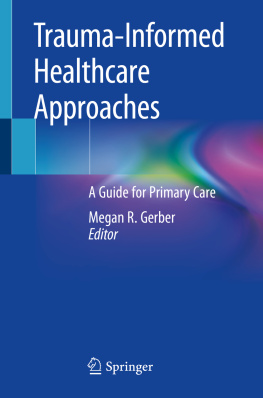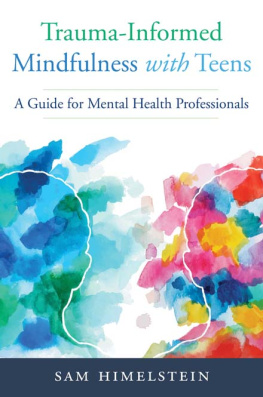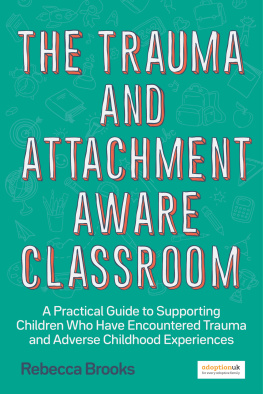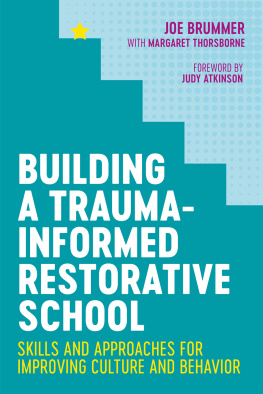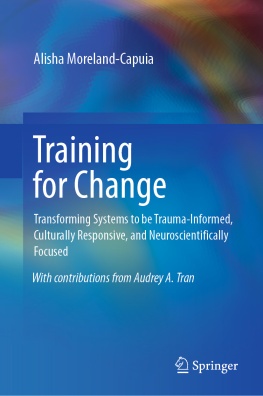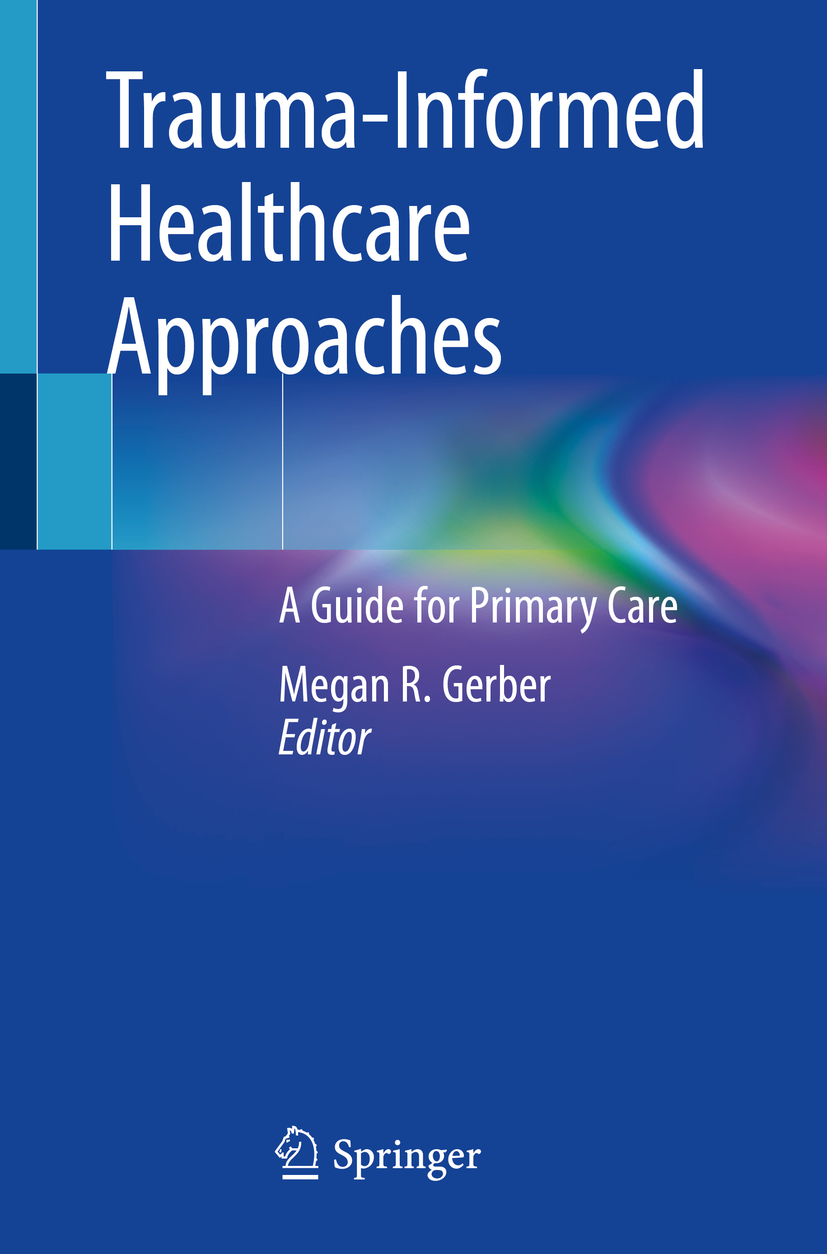Trauma-Informed Healthcare Approaches
A Guide for Primary Care
Editor
Megan R. Gerber MD, MPH
Section of General Internal Medicine, Boston University School of Medicine, Veterans Affairs (VA) Boston Healthcare System, Boston, MA, USA
ISBN 978-3-030-04341-4 e-ISBN 978-3-030-04342-1
https://doi.org/10.1007/978-3-030-04342-1
Library of Congress Control Number: 2019934093
Corrected Publication 2019
Springer Nature Switzerland AG 2019
This work is subject to copyright. All rights are reserved by the Publisher, whether the whole or part of the material is concerned, specifically the rights of translation, reprinting, reuse of illustrations, recitation, broadcasting, reproduction on microfilms or in any other physical way, and transmission or information storage and retrieval, electronic adaptation, computer software, or by similar or dissimilar methodology now known or hereafter developed.
The use of general descriptive names, registered names, trademarks, service marks, etc. in this publication does not imply, even in the absence of a specific statement, that such names are exempt from the relevant protective laws and regulations and therefore free for general use.
The publisher, the authors, and the editors are safe to assume that the advice and information in this book are believed to be true and accurate at the date of publication. Neither the publisher nor the authors or the editors give a warranty, express or implied, with respect to the material contained herein or for any errors or omissions that may have been made. The publisher remains neutral with regard to jurisdictional claims in published maps and institutional affiliations.
This Springer imprint is published by the registered company Springer Nature Switzerland AG
The registered company address is: Gewerbestrasse 11, 6330 Cham, Switzerland
This book is dedicated to our patients who have taught us more about healing than any lecture or book and to our families who have been a bedrock for all of us as we have faced the difficult, tragic, unfathomable, and joyful aspects of caring for survivors of trauma. Thank you.
Preface
In recent years, trauma-informed care (TIC) has gained traction as an important set of principles that should guide optimal healthcare delivery. Our understanding of the profound impact traumatic exposure has on health is not new, but the recent #METOO movement has resulted in expanding interest in optimizing the healthcare response to interpersonal trauma. The literature contains many offerings on TIC in mental health, substance abuse, and pediatric care settings, but there has been comparably less published on TIC principles in general adult medical settings. There is a continuum from being trauma-aware to trauma-informed. Organizations may be trauma-aware and have outstanding trauma-focused care, but being trauma-informed is a process of infusing an entire organization or system with a guiding set of principles that reorders the environment to promote safety, empowerment, and healing for both patients and staff. A truly trauma-informed health system understands its community and collaborates with stakeholders, service providers, and relevant social services.
This book is geared toward general medical practitioners, healthcare administrators and leaders. While trauma has a profound impact on global health, this volume restricts its focus to the United States and similar countries. It begins with a broad overview of trauma and the suspected mechanisms by which it creates poor health. A discussion of practical applications of TIC principles is followed by an introduction to the concept of TIC as an important promoter of health equity through acknowledging and addressing trauma in individuals and communities. The World Health Organization (WHO) Commission on Social Determinants of Health (SDoH) ( http://www.who.int/social_determinants/thecommission/finalreport/en/ ) described health systems as intermediary determinants of SDoH. Trauma is inextricably linked to many SDoH, so conceptualizing healthcare as having a role in mitigating SDoH is another way of understanding its role in achieving health equity and reducing disparities that often result from trauma.
The concept of cultural humility and its critical role in TIC is followed by a series of chapters (Part II) on selected special populations including men of color, gender nonconforming persons, and US military Veterans. While not all groups who are susceptible to trauma are covered, these chapters provide useful paradigms to apply/customize TIC principles to vulnerable populations.
Part III of the book is geared toward both clinicians and healthcare administrators. It covers practical clinical strategies for primary care (adult, adolescent and pediatric) and maternity care settings. Chapter discusses adolescent and pediatric trauma-informed care through the lens of developing and extending trauma-informed systems. This chapter is relevant to all healthcare settings. Finally, a chapter on trauma-informed holistic nursing provides an overview on transforming nursing care across the health system. The book concludes with a chapter on fostering resilience and self-care for staff; an organization cannot transform into a truly trauma-informed system without understanding the needs of staff who treat survivors.
Megan R. Gerber
Boston, MA, USA
Acknowledgments
We are grateful to the Society of General Internal Medicine (SGIM) for providing a professional home to many of us and a platform over the years for discussing and advancing the needs of trauma survivors in general medical settings. We wish to especially acknowledge our colleagues in the Physicians Against Violence Interest Group for supporting us and shaping our collective voice. William R. Bachman, MD; Christine J. Kolehmainen, MD, MS; and Aasia S. Romano, MD, provided invaluable assistance in content review and preparation of this book.
Disclaimer
The views expressed in this book are those of the authors and do not necessarily reflect the position or policy of the Department of Veterans Affairs or the United States government.
How to Use This Book
Trying to implement trauma-specific clinical practices without first implementing trauma-informed organizational culture change is like throwing seeds on dry land.
Sandra Bloom, MD
Creator of the Sanctuary Model
The reader can access topics of interest and concern as the chapters can be read independently of one another. For administrators, we recommend using guidance from the Substance Abuse and Mental Health Services Agency (SAMHSA) ( https://www.samhsa.gov/nctic/trauma-interventions ) or the Center for Healthcare Strategies (CHCS) ( http://www.chcs.org/media/ATC_whitepaper_040616.pdf ) to determine where an organization is on the continuum of trauma informed care (TIC) implementation. Being trauma aware is a critical first step. There is no one size fits all approach to implementing TIC, and most experts do not offer one standard implementation checklist for this reason. Because it provides practical setting-based examples, this book can be a useful adjunct to implementing TIC using the guiding principles laid out by SAMHSA.

